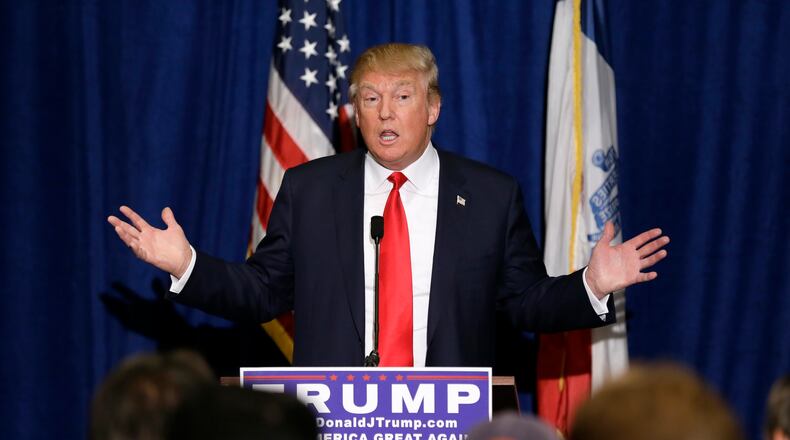Donald Trump's ground game is headed to Georgia.
The unflappable, seemingly unstoppable billionaire this week announced the hiring of staff in Iowa and South Carolina to convert his front-runner poll numbers into 2016 primary votes.
Representatives of the Republican presidential candidate have already interviewed potential Georgia operatives, we’re told.
Which made Frank Luntz's Tuesday appearance at the annual summer gathering of the Georgia Chamber in Macon all the more timely. Luntz is the national Republican Party's favorite pollster. And for the past several weeks, he has been Donald Trump's punching bag.
On an Iowa stage in July, ‘twas the frumpy Luntz who prompted the fashion-conscious billionaire to question the heroics of U.S. Sen. John McCain, the former Vietnam War POW. After that first Fox News debate earlier this month, ‘twas Luntz again who conducted the televised focus group that panned Trump’s performance.
But having witnessed firsthand the bulletproof nature of The Donald, Luntz has shifted his position. Just a day before his Macon presentation, Luntz conducted a focus group of Trump supporters in Alexandria, Va.
The headline that appeared on the morning of Luntz’s appearance in Macon: “Trump may be ‘impossible to take down,’ top Republican pollster says.”
"Honestly, my legs are shaking looking at these numbers. All those people who think he's going to implode are wrong. He's not going away," Luntz told a reporter for a New Jersey news site.
But the GOP pollster had more to say to the Georgia Chamber. Specifically, Luntz told the business leaders — very gently, because they were paying him — that they were part of the problem.
“You know, I own a small business, and I support what you do. But sometimes your messaging drives me crazy,” Luntz said. “You seem to communicate about the owners rather than the workers.” More populism is the order of the day.
It’s a sensitive area. Business interests within the Georgia GOP have blocked efforts by the Republican base to register their displeasure with legalized gay marriage. Then there was last year’s U.S. Senate race. The Georgia Chamber endorsed U.S. Rep. Jack Kingston of Savannah in the Republican primary. Let it be noted that U.S. Sen. David “Outsider” Perdue opened the Macon meeting.
Back to Luntz: He explained himself by focusing not on Trump, but on Democrat Bernie Sanders, the U.S. senator from Vermont who has topped former Secretary of State Hillary Clinton in two New Hampshire polls and is closing in on her in Iowa. He showed a clip of Sanders condemning “establishment politics and inside-the-Beltway ideals.”
“Bernie Sanders is tapping the same anger Donald Trump is,” the pollster said. “His language is so powerful to a middle class that is struggling to remain middle class, and a working class that believes it will never make it to middle class.”
Luntz is a Republican, and his opinion of Hillary Clinton is correspondingly low. He said her leaky, 38 percent national approval rating should prevent her from becoming the Democratic nominee. On the other hand, Luntz also highlighted a Clinton TV ad that he said was the best of the early campaign — in which the former first lady promises to “reshuffle the deck” for a middle class that has been forced out of the game.
Again we have that theme of economic estrangement.
After his talk, I wanted to hear more about Trump and the focus group. The phrase “tea party” has pretty much disappeared from this election cycle’s lexicon. Is Trump a distillation of that movement? I asked.
“He’s so much more,” Luntz said. “Trump is drawing from a wider spectrum of people who, for whatever reason, believe that Washington and the media and the elites don’t listen.”
Immigration is the initial draw for many. They’re not bothered by Trump’s talk of deporting the 11 million illegal immigrants currently estimated to be in the U.S. — regardless of the moral or economic consequences. Luntz estimates they make up 15 percent of general election voters. It is their intensity that presents the problem in a GOP primary.
“Those 15 percent want it so much, and they applaud him every time he says it,” Luntz said. “They don’t care about the cost. There is right and there is wrong. And Trump communicates to that.”
Does Trump have a ceiling? “Yes, but I don’t know what it is,” said Luntz, clearly frustrated by his inability to explain the billionaire. “You attack him, he goes higher. You leave him alone, he goes higher. You shake his hand, he goes higher. You punch him in the arm, he goes higher. Everything he does, he goes higher.”
For Republicans, the crucial danger that Trump poses comes from his refusal to rule out a third-party run if his Republican primary efforts somehow tank. Nineteen of 29 focus group members said they would follow Trump out of the party, Luntz said.
That was a statistic that required some response.
One alternative reason for Trump’s refusal to rule out a third-party effort was put forward by Seth Weathers, a Georgia GOP strategist who has lately acted as a local apologist for the billionaire. Some Republicans in several early primary states may soon attempt to keep Trump off the ballot. The third-party threat could be a warning to the Republican National Committee that such moves could backfire, Weathers theorized.
“It’s unprecedented that any state GOP would attempt to keep the Republican front-runner off the ballot. Is the establishment that afraid of sunlight?” Weathers asked.
About the Author



